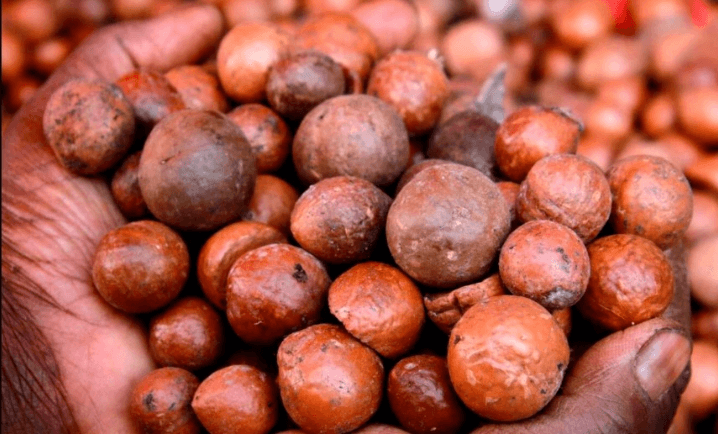
Agriculture Cabinet Secretary Mutahi Kagwe has unveiled firm measures aimed at safeguarding Kenya’s macadamia sector following alarming reports that destructive pests and harmful pesticides are wiping out nearly 40 percent of annual production. Speaking during a high-level meeting with industry stakeholders, the CS was briefed on the severe challenges facing farmers, including climate-driven pest invasions that damage flowering nuts, bore into shells, weaken leaves, and trigger widespread premature nut drops.
According to Jane Maigua, Chair of the Macadamia Association of Kenya (MACNUT), Kenya produces an estimated 45,000 metric tonnes of macadamia nuts annually, of which 44,100 tonnes are marketable. However, farmers lose approximately 17,640 tonnes to insect damage every year including more than 2,200 tonnes of high-value export kernels. These losses translate to an economic setback of KSh. 2.88 billion annually. Processors, Maigua added, face additional expenses due to the extra labour and electricity required to sort insect-damaged nuts.
KEPHIS identified stink bugs as the most destructive threat, followed by nut borers, lace bugs, moths, rats, and thrips. Stink bugs cause internal kernel damage, nut borers tunnel inside shells, while lace bugs feed on leaves, causing yellowing and defoliation. Moths attack nuts before shell hardening, leading to early nut fall. Rising temperatures have also intensified thrip infestations, reducing flower and nut formation. KEPHIS further warned that climate change is worsening pest pressure and reducing the effectiveness of chemical pesticides.
In response, the Pest Control Products Board (PCPB) outlined emergency legal provisions enabling fast approval of organic and pyrethrum-based pesticides. The Board explained that once PPCK and KEPHIS confirm pest pressure, PCPB can fast-track emergency-use products, conduct local efficacy trials, establish proper application rates, and assist counties in farmer sensitization on safe pesticide use.
PCPB CEO Fredrick Muchiri assured the CS that pyrethrum-based products would take priority as long as they meet safety and performance requirements. He noted the need to reduce dependence on imported pesticides, which have now surpassed 20 million kilograms annually.
CS Kagwe directed AFA, KEPHIS, PCPB, and county governments to ramp up farmer awareness programs through radio, extension services, and expanded pest management training. He further emphasized reviving Kenya’s domestic pyrethrum value chain to provide farmers with affordable, locally produced, and safer pest-control alternatives. The CS also issued strict directives to protect PPCK’s intellectual property, warning that private companies using PPCK’s scientific formulation data must pay for access or risk losing their approval.
Kagwe stressed that PPCK’s scientific data is a national asset and a crucial revenue generator as Kenya scales up homegrown pesticide solutions to protect farmers and maintain access to export markets.





